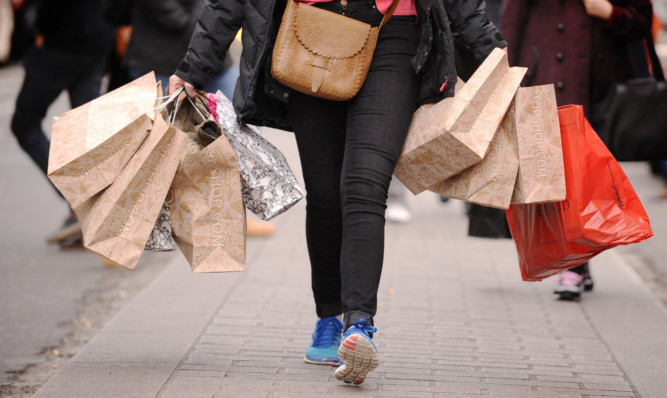Retailers have said there needs to be greater certainty about the impact Holyrood’s new income tax powers will have on consumers north of the border.
David Lonsdale, director of the Scottish Retail Consortium, said that despite improvements in the economy shoppers are still being “cautious” with their cash and “retail sales remain lacklustre”.
He was speaking after new figures showed total sales in Scotland last month fell by 2.9% from April last year, with food sales down by 4.6%.
Like-for-like sales – which strip out factors such as new store openings – were also down over the year, with a 5.1% drop in food sales contributing to a 3.4% decrease overall, according to the latest BRS-KPMG Retail sales Monitor.
But the timing of Easter, which was celebrated in April last year and March this year, was said to have distorted the figures.
Quarterly average figures, adjusted for the effect of online shopping, showed a 0.7% increase in non-food sales, with this being led by sales of fashion and footwear as sunny weather in April was reported to have boosted sales of spring and summer clothing.
David Lonsdale, director of the Scottish Retail Consortium, said: “Over a three-month period, which irons out both positive and negative Easter distortions, we find that real term food sales actually recorded their best performance since the start of 2014.
“Over the same period non-food retail sales, once adjusted for the effect of online, mustered growth of 0.7%. Clothing, fashion and footwear was the stand-out category once again, with health and beauty products such as sun cream and skincare also doing well.”
But he added: “Whilst pay rises across the economy are forecast to continue to outstrip inflation, the fact is that shoppers remain cautious and retail sales remain lacklustre.
“This brings into sharp focus big upcoming decisions which will affect disposable incomes and take home pay, notably the setting of the new Scottish rate of income tax and the proposed replacement of council tax.
“Greater certainty is needed over how the amount of money in people’s pockets and indeed consumer spending more widely will be affected by these changes.”
From April next year there will be a Scottish Rate of Income Tax, which will see the UK Treasury deduct 10p from standard and upper rates of income tax in Scotland and give MSPs the power to decide how to raise cash.
Holyrood is also due to get more powers over income tax as a result of the changes proposed by the Smith Commission on devolution, which the new Conservative Government has pledged to implement.
David McCorquodale, head of retail at KPMG, commented on last month’s sales figures: “Spring fashions and April sunshine have helped boost Scottish sales.
“Although the figures are negatively distorted by the timing of Easter, an assessment of the quarterly figures to April, adjusted for the effect of online, show that the 0.7% growth in Scottish non-food sales has been driven by the fashion and footwear categories. Despite plenty of April showers, some with snow, the sunniest April for 70 years helped get spring/summer fashions off to a good start which helped build momentum and, hopefully, margins.”
While he said sales in Scotland would not benefit from major events this year such as the Commonwealth Games and the Ryder Cup, he added: “This quarter’s figures give some encouragement for a sustained recovery in the fortunes of retailers north of the border.”
